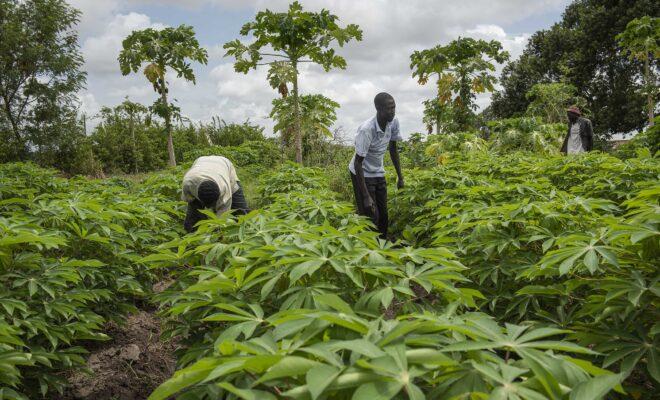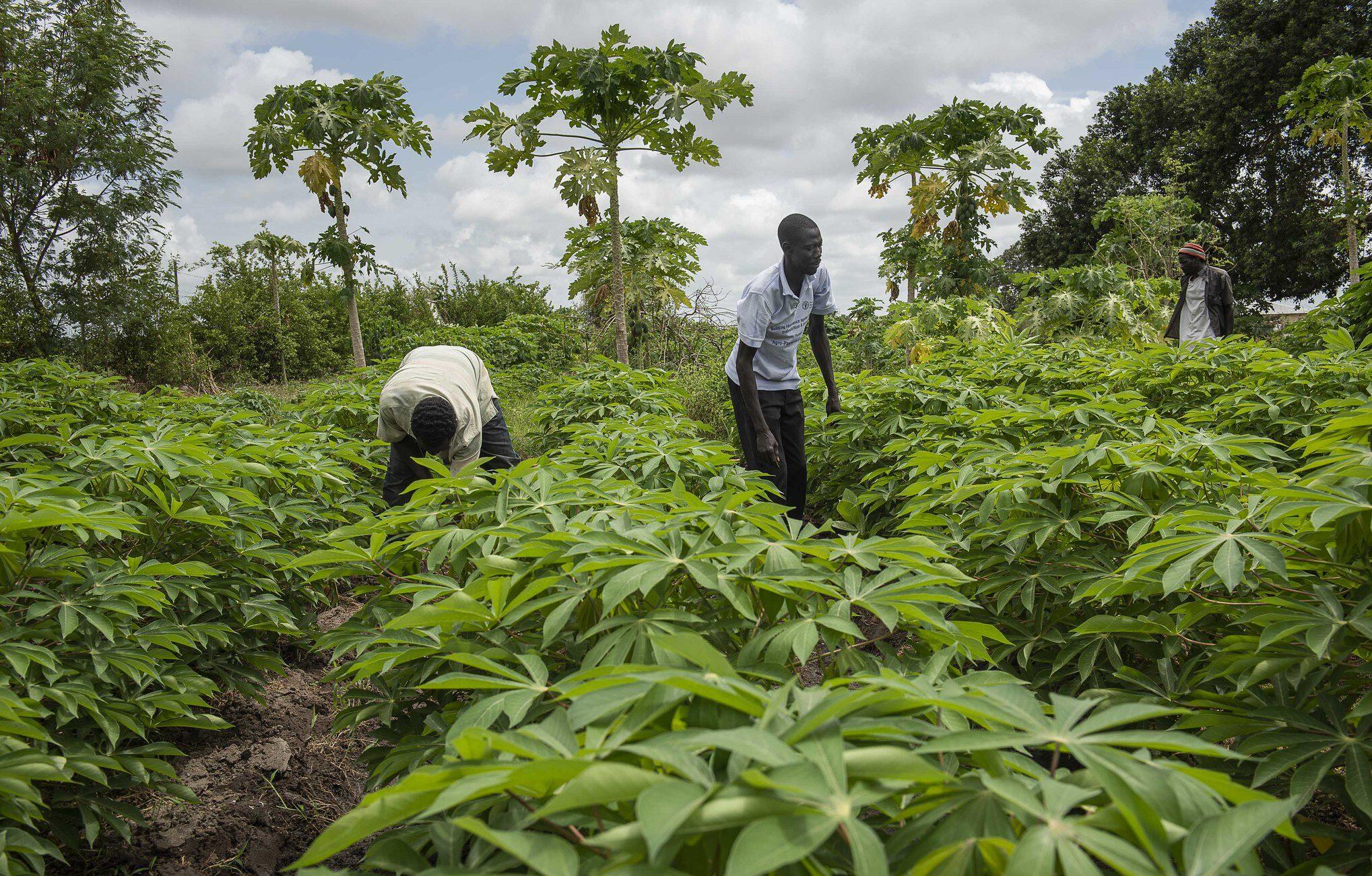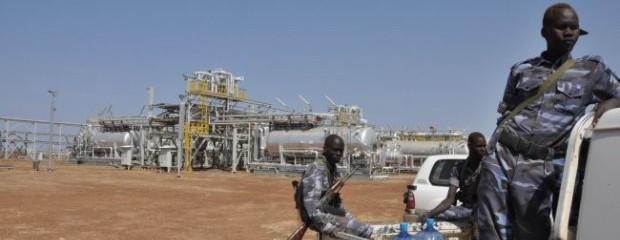Africa’s quest for food security must be premised on continent’s realities

While there’s an urgent need to improve productivity, emphasis should be laid on ridding the food systems of inequality.

A community garden and farmer field school in Njoben, The Gambia. Credit: Freya Morales
Lately, there have been quite a few proposals, discussions and even debates, some in high places, focused on developing the technological capacity of the agricultural sector in Africa to address food insecurity on the continent.
The discourse has seen a spectacular showcase of big numbers, some of that depressing, others quite reassuring, at least from the outset.
Dissecting Africa’s food insecurity and imagining solutions lends itself to the use of data. It is impossible to avoid reference to the big numbers, for example the report by the Food and Agriculture Organisation notes that 282 million people in Africa experienced hunger in 2020. There is also the alarm raised by the International Federation of the Red Cross, in April, that at least 100 million people in Africa were facing catastrophic levels of hunger. All these help build a strong case for urgent intervention. That a continent which accounts for 60% of the world’s arable land, imported 85% of its food worth $35 billion between 2016 and 2018 depicts the sector’s low capacity. Moreover, this is projected to reach an even more mind-boggling figure of $110 billion a year by 2025.
And then there is a different set of data capturing a spate of huge investments at different levels of the sector’s value chain, mainly by donor agencies and the private sector. A significant share of this has gone into improving efficiency by leveraging technology and using high-quality inputs. Agri-tech start-ups alone raised $60 million in 2020, according to Disrupt, a website that provides data on start-up funding.
Technology has been rightfully hailed for improving productivity and increasing farmers’ access to markets for their products. However, though tech has a significant role to play in the continent’s quest for food security, it ought to be embraced while paying attention to Africa’s peculiar socio-economic and cultural context and realities. Technology and other strategies such as research and financing must be employed in ways that promote real and lasting transformation, and not exclude smallholder farmers and perpetuate inequality in the food systems.
A participatory food system, not just a proficient one.
One reality is that whereas the continent is rapidly urbanising, many people – about a half of the population – live in the villages, thus putting pressure on land. Access to land is still limited, despite the continent’s much-touted abundance of arable land. Smallholder farmers labour in tiny plots of land as the elites and multinationals control massive tracts of land from where they can practice high-tech, highly mechanised agriculture. Patriarchy and unfair cultural practices have further exacerbated the terrible experiences of women, who produce 70% of Africa’s food, and the youth in this lopsided arrangement.
Policies pursued in the sector must therefore not disenfranchise the vulnerable groups further. The state must protect women’s rights to land and property, and we must redouble our efforts in socializing men and women to confront patriarchy.
Research and financing should prioritize the needs of smallholder farmers, especially now that many are struggling to bounce back from the devastating impacts of COVID-19 pandemic. This is the time for government research institutions to take the lead in research and innovation and develop simple and appropriate solutions that incorporate indigenous knowledge and experiences of smallholder farmers. This is too important a role to be left under the control of the private sector and market forces.
If the continent’s food security were to be conceived as simply producing enough volumes, without minding who is engaging, then just a handful of big investors would be up to the task! But it’s more complex than that – true security and sustainability come with a more open and participatory food system where both the small- and large-scale farmers have an equal opportunity to flourish.
Increased production should not be the only priority
Another fact is that the roots of Africa’s food insecurity go beyond inadequate production. There are millions of people living in countries or localities with enough supplies, but they still go to bed hungry due to low purchasing power and limitations of the food market systems. While the rise and fall of food prices in rural and urban areas is significantly informed by the performance in the farms, people living in poverty perpetually lack enough to eat, especially in the cities where the cost of living is a lot higher. So even as governments desperately search for resources to resuscitate their economies which have borne the brunt of the COVID-19 pandemic, they must prioritize social safety nets for the most vulnerable and implement broad and specific budget policies that reduce poverty and inequality.
In the villages, smallholder farmers struggle to produce more than they can eat so they can sell the surplus and buy other foodstuff to diversify their sources of nutrition. Their fate cannot be left in the hands of a few elites and multinationals who benefit from their heavy investment in technology and economies of scale, and often control prices. For those living along the borders, support should also include making it easy to pursue markets in neighbouring countries through measures such as accelerating the lifting of all the barriers that stand in the way of full implementation of the Africa Continental Free Trade Area (AfCTA).
Confronting inequalities perpetuated in the agricultural value chains is critical since it easily spills over to other sectors such as health and trade with which have strong linkages with the food systems.
An equitable, secure food system must begin now
Whether or not Africa will achieve the goal of eliminating hunger and food insecurity in the next four decades, as is laid out in Agenda 2063, depends on the actions or inactions of today. And it helps that the ideas are already out there. For example, the African Union member states adopting the Malabo Declaration in 2014 demonstrates that Africa knows the specific steps needed to fix its food insecurity problem. But another sad African reality – and this transcends the quest for food security – is the pervasive lack of action by leaders on such commitments. The second biennial review of the Comprehensive Africa Agriculture Development Programme (CAADP) which tracks the progress of the commitments in the Malabo Declaration, published in February last year, showed that only four out of 49 countries were on track to achieving the laid-out goals by 2025. It is unlikely that the statistics will look any better in the next review due soon, owing to the pandemic’s effect on the economy.
Forums that seek to accelerate the quest for food security must, more than coming up with novel or grand ideas, implore leaders to prioritize investing in agriculture even during these lean times and emphasise the centrality of government leadership in growing the sector and most importantly adopting a justice lens to our food systems.
Direct investment in the food systems must also be accompanied by active steps to confront conflict and climate change, the other two big threats to food security, alongside COVID-19.





